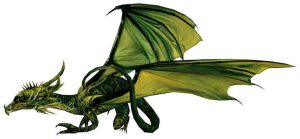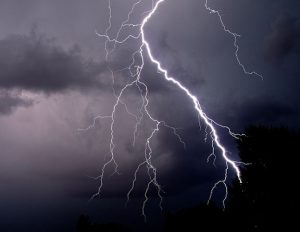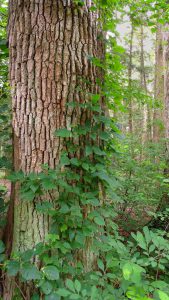This is the second story in a series. Click here to read all parts from the beginning.
At first glance, the tiny speck circling high above the white stone walls of the Romanian castle might easily have been taken for a hawk or an eagle. I had come here in search of something else, though; and I wasn’t at all surprised when the long, scaly wings of a dragon became visible.
The castle, built on high ground above what once was a medieval town in the Transylvanian hills, had been converted during the communist era into the municipal utility building. It now served as both the waterworks and the control facility for a hydroelectric power station. Or, to be more precise, those had been its functions until the sudden appearance of dragons had sent its workers scurrying away in a panic.
“Well, Chris, at least it’s not a nuclear power plant,” my companion Shay observed, as we stood beside the flooded main road into town. The wide-open sluice gates must have been letting massive amounts of water flow past the castle for days. A truck engine started up and then roared away—again, not much to my surprise—as the town official who had given us a ride from the Bucharest airport evidently had second thoughts about sticking around.
“Small mercies,” I agreed, glancing down at our dusty suitcases, which held our fire suits and other dragon-wrangling gear. Shay and I had gone into business three years ago in Tennessee as Dragon Control, Inc., after the skies above Knoxville mysteriously filled with dragons one evening. Nobody had ever discovered why. Until now, we’d thought Knoxville was the only area affected—and then we learned otherwise last week when we got frantic phone calls from Romanian officials pleading for our services.
They had wired us a generous amount for expenses, with the promise of much more if we succeeded in ridding their country of dragons. Shay and I hadn’t needed much convincing to take off for an international adventure. We had been training a few assistants in Knoxville who could handle things well enough—we hoped—in our absence.
The road curved steeply upward through a thick forest, which didn’t seem too creepy on this bright, sunny afternoon until I heard rustling leaves very close behind me. I spun around, alert for danger; but there was only a tiny old woman climbing slowly onto the road from a path.
She wore a long multicolored dress that looked like something out of a medieval fairytale, with thick stockings and heavy shoes. Curly gray hair, which seemed to have a mind of its own, tumbled over a colorful shawl. Her face was deeply lined, and the hands leaning on her walking stick were gnarled and spotted.
“Be welcome here, dragon slayers,” she said in accented but understandable English. “Your arrival was foretold in the ancient prophecies and has long been awaited.”
I figured this was a roundabout way of complaining that we’d taken forever to get here. If so, it seemed unfair, considering how far we had traveled. Deciding to ignore it, I answered what she’d said first.
“Ma’am, we appreciate the welcome, but we are not dragon slayers. We are modern animal-control specialists, licensed by the State of Tennessee, and we capture and relocate dragons humanely.”
She just kept on nodding, as if she’d been so certain of her description that nothing would change her mind. Then again, maybe what I’d said just didn’t translate well into her language, or she didn’t know enough English to make sense of it.
“You are the one chosen to travel through the sorcerers’ portal,” she declared, staring fixedly at me with wide brown eyes as if she’d totally forgotten Shay was here. “You are the Hermaphrodite, the one who is neither female nor male, drawing upon all the powers of the earth and sky.”
My first thought was that she must have been reading too many fantasy novels. Even in a forest in Transylvania, who really believed that stuff? And hadn’t she ever seen a genderqueer person before?
Shay, bustling around by our suitcases, saved me the trouble of having to reply when he spoke. “Uh, Chris, you might want to put on your fire suit now. That dragon is heading straight for us.”
I grabbed my gear from Shay, who was already suited up. Sure enough, the dragon was very near the treetops and coming this way fast. It was much bigger than we had expected. Most of the dragons we’d captured in Knoxville had been about the size of the steers that Shay wrestled in the rodeos, but this one easily could have swooped down on an elephant and carried it off.
Tugging my visor into place, I looked through it, finding the view not at all improved. Daddy Dragon was bearing down on us like a tornado, and he didn’t look any smaller. He probably could’ve carried off two elephants, one in each front claw.
I stood there without moving, as did Shay. Out local visitor didn’t run away either, which did surprise me. Wearing our fire suits didn’t actually make it much safer for us to stand facing down this behemoth, given the fact that he could squash us flat no matter what we were wearing. But at least we looked like well-equipped professionals. Not soon-to-be-dead ones, I hoped.
Just as the dragon’s shadow fell over the road, he disappeared.
Literally. Disappeared. Meaning that I had been looking directly at him, and an instant later he wasn’t there.
I turned my head from side to side. Nothing. The Romanian woman was still standing right next to me, placidly nodding, like vanishing dragons weren’t anything new around here.
When I took off my headgear for a better view without the visor, that was when I saw the sorcerers’ portal. Or at least, that was what I assumed the woman had meant when she used that term. Just above the road, extending for a short distance above the trees on either side, a square of blue sky flickered like a poorly streamed video.
Shay, who was also bare-headed by now, stared at the portal for several seconds before he said what we both were thinking.
“No way either of us is going through that.”




